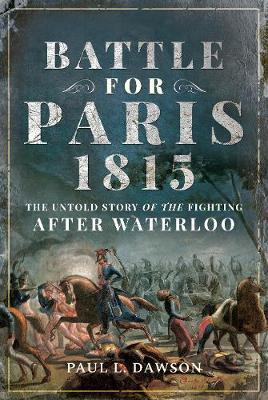Battle for Paris 1815

Battle for Paris 1815
So why was Exelmans still fighting for Paris? Surely the fighting had ended on 18 June? Not so. Waterloo was not the end, but the beginning of a new and untold story.
Seldom studied in French histories and virtually ignored by English writers, the French Army fought on after Waterloo. At Versailles, Sevres, Rocquencourt and elsewhere, the French fought off the Prussian army. In the Alps and along the Rhine other French armies fought the Allied armies, and General Rapp defeated the Austrians at La Souffel - the last great battle and the last French victory of the Napoleonic Wars.
Many other French commanders sought to reverse the defeat of Waterloo. Bonapartist and irascible, General Vandamme, at the head of 3rd and 4th Corps, was, for example, champing at the bit to exact revenge on the Prussians. General Exelmans, ardent Bonapartist and firebrand, likewise wanted one final, defining battle to turn the war in favour of the French.
Marshal Grouchy, much maligned, fought his army back to Paris by 29 June, with the Prussians hard on his heels. On 1 July, Vandamme, Exelmans and Marshal Davout began the defence of Paris. Davout took to the field in the north-eastern suburbs of Paris along with regiments of the Imperial Guard and battalions of National Guards.
For the first time ever, using the wealth of archive material held in the French Army archives in Paris, along with eyewitness testimonies from those who were there, Paul Dawson brings alive the bitter and desperate fighting in defence of the French capital. The 100 Days Campaign did not end at Waterloo, it ended under the walls of Paris fifteen days later.
PRP: 180.00 Lei
Acesta este Prețul Recomandat de Producător. Prețul de vânzare al produsului este afișat mai jos.
162.00Lei
162.00Lei
180.00 LeiLivrare in 2-4 saptamani
Descrierea produsului
So why was Exelmans still fighting for Paris? Surely the fighting had ended on 18 June? Not so. Waterloo was not the end, but the beginning of a new and untold story.
Seldom studied in French histories and virtually ignored by English writers, the French Army fought on after Waterloo. At Versailles, Sevres, Rocquencourt and elsewhere, the French fought off the Prussian army. In the Alps and along the Rhine other French armies fought the Allied armies, and General Rapp defeated the Austrians at La Souffel - the last great battle and the last French victory of the Napoleonic Wars.
Many other French commanders sought to reverse the defeat of Waterloo. Bonapartist and irascible, General Vandamme, at the head of 3rd and 4th Corps, was, for example, champing at the bit to exact revenge on the Prussians. General Exelmans, ardent Bonapartist and firebrand, likewise wanted one final, defining battle to turn the war in favour of the French.
Marshal Grouchy, much maligned, fought his army back to Paris by 29 June, with the Prussians hard on his heels. On 1 July, Vandamme, Exelmans and Marshal Davout began the defence of Paris. Davout took to the field in the north-eastern suburbs of Paris along with regiments of the Imperial Guard and battalions of National Guards.
For the first time ever, using the wealth of archive material held in the French Army archives in Paris, along with eyewitness testimonies from those who were there, Paul Dawson brings alive the bitter and desperate fighting in defence of the French capital. The 100 Days Campaign did not end at Waterloo, it ended under the walls of Paris fifteen days later.
Detaliile produsului










